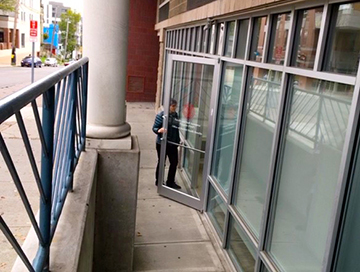Confidentiality
We know that confidentiality is of utmost importance to our clients. Our staff is committed to protecting your privacy, and helping you feel comfortable sharing deeply personal concerns and professional challenges.
> View our Confidentiality Agreement
Our privacy practices
Services provided by FSAP are confidential. We do not disclose names of clients, nor do we share client records or information with other university offices:
- FSAP's services are provided by licensed professionals who are committed to confidentiality as a matter of professional ethics and New York State law.
- No acknowledgement of your status as a client or information about you will be released to anyone without your written permission, except as authorized or required by law, or in our judgment as necessary to protect you or others from a serious threat to health or safety.*
- FSAP records are completely separate from all other university records. Information does not become part of your personnel file and the use of services will not affect your job security or future promotions.
- FSAP uses a secure electronic records system for further protection of records and to facilitate secure communication.
- FSAP does not disclose names of clients. Cornell receives only a periodic statistical breakdown of overall FSAP usage.
- FSAP staff may share relevant information with one another as needed to assure continuity or quality of care.
- In consultation with your FSAP counselor, you may allow an FSAP staff member to confer, consult, and collaborate with your supervisor, human resources representative, or others in or outside of the workplace. The FSAP staff member will discuss with you whom it would be helpful to talk with and why, and identify what information would be helpful to obtain from or disclose to others. No information will be shared without your written permission.
Release of information
Whether you talk with us about yourself or discuss concerns about someone else, we need your permission in order to share information about you with anyone.
If you want FSAP to provide any kind of information about you to another person, please talk with a member of our staff about your specific desires (e.g., what information you want us to share with whom).
The FSAP Authorization for Release of Confidential Information (pdf) documents your permission. You have the right to revoke this release in writing at any time, except to the extent that FSAP has already relied on or acted upon this authorization.
Staff training
We reinforce our fundamental commitment to confidentiality through yearly training for everyone who works for FSAP. Regular audits of our electronic health record provide an extra measure of protection.
*Situations that may prompt disclosure of confidential information
- Abuse of a child: Counselors who know or have reasonable suspicion that a child under the age of 18 is being abused or neglected are legally mandated to report this situation to the appropriate agency.
- Imminent harm to self: If a counselor believes you are in danger of physically harming yourself and are unwilling or unable to follow treatment recommendations, they may contact a family member or another person who may be able to protect you. The counselor may seek your involuntary admission to a hospital if deemed necessary.
- Imminent harm to others: If a counselor has reason to believe that you are actually threatening physical violence against another person, or if you have a history of physically violent behavior and that you pose a real threat to the safety of another person, they may be required to take some action to insure that the other person is protected. Such action may include contacting the police, notifying the other person, and/or seeking involuntary hospitalization.
- If it is authorized or required by law.
The situations described above are rare. However, if they should occur, it is our practice to discuss with you any action that is being considered. You should be aware that the FSAP is not legally obligated to inform you or seek your permission, especially if such a discussion would prevent securing your safety or the safety of others. If disclosure of confidential information becomes necessary, only the information necessary to protect you and/or another person will be released.


